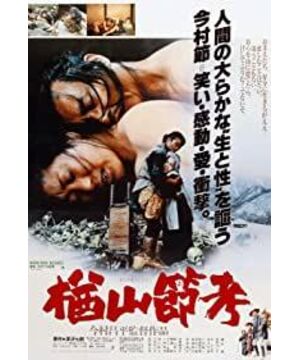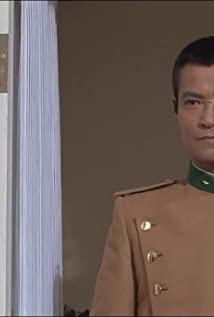"Narayama Festival Kao" directed by the famous Japanese film director Imamura Shohei is based on the famous novel "Narayama Minoru Kao" by Shichiro Fukasawa. The film withholds the clue of the consciousness of human survival and development, reflecting the survival consciousness and means of the people in the remote mountainous areas of Japan, and also expressing the director's understanding and thinking on the grand theme of human survival consciousness.
The film shows Narayama Village, a residential area in the mountains of northern Japan. The land there is barren, the climate is high and cold, the living conditions are extremely bad, it has been in a semi-primitive farming state for a long time, and the productivity is extremely backward. Residents have formed various customs in order to enable the group to survive and develop. For example, abandoning a newborn baby into the wilderness, or sending an old man who is 70 years old into the mountains and let him fend for himself. The goal is to forcibly eliminate the population without labor. In fact, this savage method has also been used in areas such as Alaska in the United States or the mountainous areas of southern Hungary. This was a reality in a society where productivity was backward and human beings were unable to change their living conditions.
The consciousness of human existence expressed in "Narayama Festival" mainly expresses human resistance to natural ecology. The film wants to reveal the human desire for survival. In the Narayama tribe's residents, it is mainly manifested in hard farming, striving for food with the sky in the extremely poor land and in the harsh climate. Work only allows individuals to survive, and it is difficult to support others. People who cannot create material wealth will be a heavy burden on others. Therefore, the loss of labor will also lose the right to survive.
The people in Narayama Village did not react strongly to their harsh living environment. They lived in tacit agreement and endurance. They see conscious death as dedicating themselves to God, and they are clearly aware that this is also a dedication that must be made for the living. Although the residents of Narayama are poor, they are so philosophical in the face of life and death. On the other hand, they cruelly eliminated those who ruined their existence: babies, old people, food stealers. They believe that anyone who destroys their survival has no right to survive, which is reasonable. This kind of sacrifice of oneself or execution of others is also their philosophy of survival.
Lingpo is an image created in the film. She is an old man who has lived in the Narayama tribe for 70 years and should go deep into the mountains to wait for death. She has lived all her life in non-stop labor. The fundamental meaning of this kind of work is to "live". She has no requirements for life, and the harsh life that cannot be changed after generations of hard work makes her face everything in front of her without complaining or despair. To live is to do, to do is to live. There is no hope and joy of improving life at all through work. Therefore, Lingpo has no greater hope, but she does not worry about the end of the future, and she is indifferent to the meaning and value of life. In her view, life is God’s will, and when people cannot work or produce food for themselves, it is reasonable to leave the world. This character's understanding of the value of her life in this way is actually an important understanding of group survival. Therefore, she went to the Narayama Festival with great determination-went deep into the mountains to wait for death. She hopes to convince the people in the village that she should go deep into the mountains due to her age and frailty. In order to eliminate their doubts about their health, they deliberately knocked out their healthy teeth to show their determination to enter the mountain. She lives not only for herself, but also to make her own possible efforts for others to live better, including using her own death to create opportunities for others to live. Therefore, she also took for granted the atrocities of people in the rain house who were buried alive for stealing food. Even when her pregnant grand-daughter-in-law was killed, she was grateful that she was missing a predator who was about to be born. Whether it is one's own death or the death of others, it should be considered for those who should be alive. This is the "survival" philosophy that the film focuses on.
"Death" is another main clue of the film, and also the main philosophical meaning of the film. The depiction of death in Japanese literature and art always has a mysterious and tragic beauty. Japanese people often regard death as a process of sublimation of character, confirmation of personality, and transcendence of emotion. This can be said to be the psychological aspect of Japanese traditional culture. Features. In "Narayama Festival Kao", Masahei Imamura's theme of dealing with death not only embodies the above-mentioned literary connotation, but also contains a larger and deeper philosophical connotation. He once said in a dialogue: "I want to show how elderly people withdraw from the stage of history in "Narayama Festival Kao". This can more highlight the meaning and weight of life, and better reflect the importance of living life and the importance of life to mankind. The value of development.” He added: “In rural Japan more than a hundred years ago, most farmers always treated death with a calm attitude. Regarding a traditional custom, farmers believed that it was not changing it. It is a kind of preservation of beauty, and it is not beautiful to change this traditional custom.” Narayama’s customs and habits express farmers’ views on fate. When the required age is reached, people will usually face death.
In "Narayama Festival Kao", Lingpo is a sacred model of the deceased. She truly understands the dialectical meaning of the contradiction and unity between life and death. The style of "Narayama Festival" reflects this in itself. "Death" is not the end of a life, but the beginning of other forms of life. Even as the end of a life, Lingpo calmly and bravely faced it. As she knows: a person born by nature must live, and when he is old, he must die. This is an inevitable law of nature. A Lingpo regards death as home, but it does not mean that she is desperate for life. It can be said that her life has not only natural meanings, but also social meanings. Lingpo is not just living for the survival of nature, she also understands the social value and meaning of life very well. She attaches great importance to the farewell wine, thinking that people would praise her while enjoying the wine and food she left behind. She thought of having taught Chenping's wife Ayu the secret of how to catch trout, and even solved a huge problem for her son Lizhu. This careful arrangement made her satisfied and very happy with herself. She calmly arranged clothes and straw mats for herself when she went up the mountain. She hoped that when she passed away, she would have a beautiful realm-the pure world of snow. She could almost imagine how she sat on the top of Na Nara Mountain like a god. The heavy snow covered all the terrifying traces of death, only a piece of pure white crystal and sacred. Not only did Imamura not violate the spirit of the original novel, but he also pushed her to a higher level.
Of course, in our opinion today, this unnatural death is quite cruel, whether it is murder or suicide, but in A Lingpo’s view it is a noble responsibility: she consciously withdraws from the stage of history in order to continue her life. responsibility. She embarked on the road of death without any sadness and nostalgia.
The death of predecessors is for the survival of future generations is the philosophical proposition of the film. However, this way of death is terrifying and trembling after all. It seems to show the cruelty of mankind's primitive competition for survival. But Shohei Imamura endowed him with a profound humanity to make it brighter and warmer. Although this cruel struggle for survival is established by convention and means that human beings have entered into a consensus contract for survival, the feelings between parents and children are still the most unbearable when facing life and death. Only when Chenping reached the emotional state of A Lingpo's kind of transcendence, could he indifferently carry his mother up the mountain-to death. But he can't. The 15-year-old Tatsupei shot and killed his father angrily because he refused to send his grandma up the mountain. But the 45-year-old didn't think so about his mother. He walked silently on the way up the mountain, because he couldn't bear the shaking of his heart. All the ugly signs of death made him miserable. Thinking of the tragic situation that his mother was about to fall into, he could not restrain his feelings. He would never accept the rice ball his mother would give him last. And his mother finally hung on his pannier. He hurried down the mountain, and when the sky finally started to snow like A Lingpo had hoped, he was like being rescued by God, suddenly detached from the horrible image of death. He felt the meaning of the "god" of his mother. It separates her from "death". He disregarded the “no turning back” rule in the custom and the difficulty and danger of re-climbing the steep and steep mountain road. He climbed up the mountain just to tell his mother himself: “It’s snowing.” Snow means a good harvest in the coming year. People will be relieved of the threat of death and complete the image of A Lingpo sitting in the snow—the image of a "god", which makes Chenping understand the noble and tragic of this sacrifice.
In contrast to A Lingpo's neighbors, Ayou and his son, Ayou refused to go up the mountain. His son tied him with a baton and drove him up the mountain. The cruelty of the son and the struggle of the father thrilled to show the persistent demand for life. This is also a human consensus that should be understood and sympathized. It was only through this desperate struggle that the barbarism, primitiveness and anti-civilization of this custom were revealed. However, in that extremely poor environment, this is another contract made by mankind for survival, which seems to have a certain degree of rationality. Looking back on Japan today, this is only a hundred years or less than a hundred years ago. This is how mankind continues to carry forward with the inevitable dilemma in the course of history.
"Sex" is an important theme given to the film by Masahei Imamura beyond the original work. It deepens the original theme of the work about human survival and competition. Masahira Imamura once said: "The life of the residents of Narayama Village has only two contents: one is labor and the other is sex." The purpose of these two actions is one to live and the other to reproduce offspring. This is the meaning of life that all living things have. . Human beings not only require themselves to live, but also have the obligation to reproduce offspring. "Narayama Festival Kao" deeply ponders this proposition.
Sex and love are often involved in many literary works. The combination of love and sexuality is one of the hallmarks of human civilization. Shohei Imamura explained this issue from another angle. The film fully reflects the differentiation of love and sexuality. In ancient societies, people regarded sex as the will of the creator, an instinct that must be possessed in order to have children and reproduce offspring, and it can happen without love. Love is the product of human civilization and the result of the development of the entire human mind. The various delicate emotions formed in love, such as love, appreciation, longing, and infatuation, have become a complex mentality of mankind, and when life is only left When it means to survive, people lose love. The residents of Narayama Village shown in the film still have respect, ridicule, kindness, indifference among social groups... all kinds of feelings between people, but they have indeed lost love.
A Lingpo has been a wife and mother all her life, but she doesn't know what love is. She lost her husband when she was in her 40s, which may have hit her material life, but it did not destroy her spiritual world. She still lives for the material world, and she lives with confidence, fulfillment, and even fulfillment. After Chenping's wife died, he wanted to marry another Xuanxuan, but it was just to replace the A Lingpo who was about to go up the mountain and become an indispensable housework labor force. And the provocative teasing between Kaji Ji and his girlfriend is like the attraction and chasing between two animals in estrus, and they quickly enter the real sex. There is a lack of emotional brewing, fermentation, and sublimation, especially in Tatsupei's second brother, Risuke, which is highlighted by Imamura Shohei. Because Lisuke was the second son, he was the poorest person in the poor family, and he was even deprived of the right to get married. Due to sexual depression, he has many nasty habit, in order to satisfy the original desire, he can have sex with the bitch. This disgusting and trembling behavior shows how poverty has tragically stripped man’s spirituality and reason, just as he is peeled from a human body, revealing bloody flesh. In order to relieve his sexual depression, Risuke's mother and brother asked the neighbor's daughter-in-law to give him a chance, but they refused. Because there are not many women in Narayama Village, they have to serve men whose status is more important than Li's help. Faced with this reality, people can't help but sympathize with this benefit. His tragedy is a continuation of the tragedy of poverty stifling life.
When Chenping went up the mountain with his mother Alingpo on his back, Lisuke got an opportunity to appreciate the most primitive enjoyment of his life-he was going wild with an old woman, which was also what his mother asked for before going up the mountain. This may be another embarrassing contrast, but it is a profound symbol. In this way, Masahira Imamura integrated the three links of life, death, and sex into the law of human development. This natural law ignores the name given to such actions by society as sacred or blasphemous. This is exactly the proposition that Imamura Shohei gave this clue. And all this is manifested in a low-minded helper, which makes people feel infinitely bitter and sorrowful when receiving this subject. The director uses this to reveal the obstacles that poverty and backwardness have to human progress. There are also some symbolic shots in the film, such as repeated use of snakes and other animals to mate, etc. This is also the director's intention to compare the behavior of lower animals with that of humans. He also often manifests itself in extremely simple and dirty environments such as the sudden erotic desires of people in the pigsty and their sex scenes. Poverty restricts love, but strengthens naked sexual desire.
Masahira Imamura spent his youth in poverty. This is not just the poverty of individuals, but the poverty experienced by ordinary people in Japan during the war and the post-war period. First, in order to supply the aggressive war launched by the militarists, the people of Japan were desperate, and after the war, they were devastated everywhere, unable to resume production. This poverty in the whole society lasted for a long time, and it had a profound impact on Imamura. His works always like to show the real life and psychological dynamics of people in poverty, and then explore the "irrationality" of society. He established a belief: as an artist, he must go to the bottom of his nation to discover the traditional tenacious idea of survival of that nation and its profound influence on the inner world of the entire nation. Specifically, it is to express the living conditions of the Japanese people in order to arouse people's thinking today. Therefore, his works are not only based on reality, but also deeply excavated and revealed. With historical and philosophical thinking, he is regarded as the director who is best at digging into the essence in the Japanese film industry.
"Narayama Festival Kao" reflects this artistic pursuit of Imamura Shohei. As early as 1957, this novel attracted his attention as soon as it was published. He believes that this novel contains huge and profound themes. He once followed Keisuke Kinoshita and participated in the filming of "Narayama Festival Kao" directed by Kinoshita. At that time, he thought that if he were to direct this film, he would have a different idea. By the early 1980s, the problem of aging worldwide was becoming more and more serious. He therefore asked for a re-adaptation of this novel. He wanted to show the serious issues of life and death, the end and continuation of life in the film, so that people could understand the major life issues of aging and death in a philosophical sense. It should be said that he has indeed expanded the artistic conception of the novel, and further opened up the themes proposed in the original work.
This film has a style that is completely different from that of Keisuke Kinoshita. Its huge philosophical content and mature artistic techniques made it the laurel of the Cannes International Film Festival in 1984, which is also the first Asian film to receive this honor. s work.
View more about The Ballad of Narayama reviews











